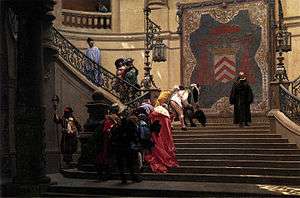Éminence grise
An éminence grise (French pronunciation: [eminɑ̃s ɡʁiz]) or grey eminence is a powerful decision-maker or adviser who operates "behind the scenes", or in a non-public or unofficial capacity.

Origin
This phrase originally referred to François Leclerc du Tremblay, the right-hand man of Cardinal Richelieu.[1] Leclerc was a Capuchin friar who was renowned for his beige robe attire, as beige was termed "grey" in that era. The style His Eminence is used to address or refer to a cardinal in the Roman Catholic Church.[2] Although Leclerc never achieved the rank of cardinal, those around him addressed him as such in deference to the considerable influence this "grey" friar held over "His Eminence the Cardinal".[3]
Leclerc is referred to in several popular works. Aldous Huxley wrote an English biography of Leclerc entitled Grey Eminence. There is also an 1873 painting by Jean-Léon Gérôme, L'Éminence Grise, which depicts him descending the grand staircase of the Palais Cardinal and the deference shown to him by others present. Leclerc is referred to in Alexandre Dumas' The Three Musketeers as the character Father Joseph, a powerful associate of Richelieu and one to be feared.
Historical examples
- Empress Jia and Empress Dowager Cixi are two examples of women who essentially ruled Imperial Chinese dynasties. As women were barred from reigning in their own right, the history of China is replete with cases of women exercising political power through their male relatives.[4]
- The Italian Christian Democratic leader Giulio Andreotti was often seen as the éminence grise of governments even when he was not actually Prime Minister.[5]
- Vice President Dick Cheney was described as an éminence grise of the George W. Bush administration, "a powerful but uncompromising politician with the ear of the president" regarding matters of national security and foreign policy.[6]
- Former diplomat and policy maker Dennis Ross was "viewed as the éminence grise, a sort of Rasputin who casts a spell over secretaries of state and presidents", according to Middle East experts who worked with him during the administrations of Ronald Reagan, George H.W. Bush, Bill Clinton, George W. Bush, and Barack Obama.[7]
- John Dee is sometimes considered an éminence grise. Officially, he was the court astrologer to Elizabeth I but exercised more power as an overall advisor to the Queen.
- Joseph Stalin was frequently called an éminence grise by Leon Trotsky whom he defeated in the succession struggles for Soviet leadership following Lenin's death in 1924.[8]
- Adolf Hitler's private secretary Martin Bormann was nicknamed the Brown Eminence.
- Choi Soon-sil was revealed by corruption investigations during the 2016 South Korean political scandal to have had previously-hidden political influence over the 11th President of South Korea, Park Geun-hye.[9][10][11][12][13] She was perceived to be responsible for masterminding governmental policy and decision making during Park's administration.[14][15][16][17][18][19][20]
- William de la Pole to Henry VI of England[21]
See also
| Look up éminence grise in Wiktionary, the free dictionary. |
References
- O'Connell, D.P. (1968). Richelieu. New York: The World Publishing Company.
- Historical reference to address in the Roman Catholic Church
- Mould, Michael (2011). The Routledge Dictionary of Cultural References in Modern French. New York: Taylor & Francis. p. 149. ISBN 978-1-136-82573-6. Retrieved 15 June 2012.
- McMahon, Keith (2013). Women Shall Not Rule: Imperial Wives and Concubines in China from Han to Liao. Lanham, Maryland: Rowman & Littlefield. p. 16. ISBN 9781442222908. Retrieved 28 February 2017.
- Andreotti. La vita di un uomo politico, la storia di un'epoca.
- Walsh, Kenneth T. (January 23, 2006). "The Cheney Factor: How the scars of public life shaped the vice president's unyielding view of executive power". U.S. News & World Report. Archived from the original on January 17, 2006.
Lawrence Wilkerson, a Cheney critic said: "The power behind the throne — an eminence grise — that's what Dick Cheney has become."
- Cooper, Helene; Landler, Mark (21 May 2011). "Obama's Peace Tack Contrasts With Key Aide, Friend of Israel". The New York Times. Retrieved 22 January 2017.
- Leon Trotsky, "Stalin: An Appraisal of the Man and His Influence"
- "A Presidential Friendship Has Many South Koreans Crying Foul". New York Times. October 27, 2016.
- "A Rasputinesque mystery woman and a cultish religion could take down South Korea's president". Quartz. October 28, 2016.
- "'It's actually a system where Choi Sun-sil tells the President what to do'". The Hankyoreh. October 26, 2016.
- "Investigations into 'Choi Soon-sil gate' widening". The Korea Times. October 23, 2016.
- "Key suspects still at large in Choi Sun-sil probe". JoongAng Ilbo. October 25, 2016.
- "All the Queen's men and women". The Straits Times. Retrieved 21 March 2017.
- "Presidential speeches found on confidante's PC: report". The Korea Herald. October 25, 2016.
- "South Korea's presidency 'on the brink of collapse' as scandal grows". Washington Post. October 29, 2016.
- "Can Pres. Park be investigated over Choi Sun-sil scandal?". The Hankyoreh. October 28, 2016.
- "Troubling revelations about Seoul's 'Shadow President': The Korea Herald columnist". The Straits Times. October 27, 2016.
- "'Choi-gate' scandal snowballing". JoongAng Ilbo. October 22, 2016.
- "South Korea's leader acknowledges ties to woman in scandal". Washington Post. October 25, 2016.
- Rimmer, Michael (2015). The Angel Roofs of East Anglia. The Lutterworth Press. p. 188. ISBN 978-0-7188-4318-2.